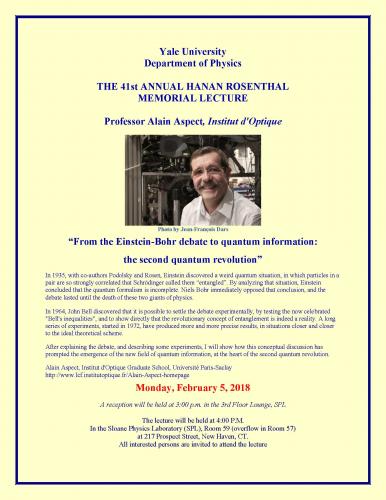
The Yale Physics 41st Hanan Rosenthal Lecture was given on Monday, February 5, 2018 by Alain Aspect, Institut d'Optique.
Monday, February 5, 2018 - From the Einstein-Bohr debate to quantum information: the second quantum revolution
In 1935, with co-authors Podolsky and Rosen, Einstein discovered a weird quantum situation, in which particles in a pair are so strongly correlated that Schrödinger called them “entangled”. By analyzing that situation, Einstein concluded that the quantum formalism is incomplete. Niels Bohr immediately opposed that conclusion, and the debate lasted until the death of these two giants of physics.
In 1964, John Bell discovered that it is possible to settle the debate experimentally, by testing the now celebrated "Bell's inequalities", and to show directly that the revolutionary concept of entanglement is indeed a reality. A long series of experiments, started in 1972, have produced more and more precise results, in situations closer and closer to the ideal theoretical scheme.
After explaining the debate, and describing some experiments, I will show how this conceptual discussion has prompted the emergence of the new field of quantum information, at the heart of the second quantum revolution.
The Hanan Rosenthal Memorial Lecture was established in honor of physicist Hanan Rosenthal, a brilliant graduate student at Columbia University and instructor at Yale. This annual lecture in atomic physics, Rosenthal’s field, is given by a distinguished leader in the field. Originally, the lecture series alternated between Columbia and Yale, which were both significant in Hanan Rosenthal’s career; in recent years, the lecture has been held only at Yale University.